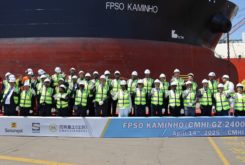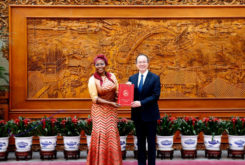Banks, stakes in oil wells and agricultural farms, among others, are to be sold under Angola´s upcoming privatization program.
The Government is already looking for investors to acquire seven factories in the Luanda-Bengo Special Economic Zone, in the outskirts of the country´s capital.
The first group of assets includes Univitro, a fully-equipped glass factory with the capacity to produce around 48 thousand square meters of glass per year, according to data from the Angolan State Assets and Participation Management Institute (IGAPE) seen by CL Brief.
The factory was tested in 2014 and is considered ready to start production.
Also in the construction materials market is Juntex, that produces mortar, with a capacity of around 65 thousand tons per year.
The factory, supplied by Brazilian Asperbras Nordeste Irrigação, Lda., was tested in 2013 and 2014, and is equipped with a fleet of trucks.
Also up for sale is Saciango, a cement bags factory, with a capacity estimated at 85 million cement bags of 20 kg per year and whose machinery was supplied by Transorga Cement, AG (Switzerland).
IGAPE has been promotings these assets to investors, the majority of them Angolans, Portuguese and Spanish, and the deadline for submission of proposals is April 22nd.
Another factory to be sold is Carton, a cardboard producing facility, whose equipment has not been fully installed.
Also unfinished are Absor, developed to produce diapers and other hospital and toilet supplies, Indugidet, a producer of shampoos and detergents, and Coberlen, planned for the production of blankets and linen.
The Luanda-Bengo Special Economic Zone was created in October 2009 with the aim of stimulating the development of the Angolan industry.
It covers more than 8,300 hectares, with all the necessary infrastructure to install industrial units in various sectors.
The Government has been promoting the assets both domestically and abroad, highlighting the country´s growth prospects, both in terms of its population and economy, and also the recently launched import substitution program.
The recently approved National Production, Export Diversification and Import Substitution (Prodesi) Programme, aims to “accelerate the diversification of the Angolan economy,” giving priority to this acceleration in the promotion of production and exports in non-oil sectors and in others with strong import substitution potential.
Products set out as a priority (individually and as a group) include rice, soybeans, corn and other grains, milk, meats, eggs, vegetables, sugar, coffee, tea and cocoa, as well as wood and derivatives, cotton, flowers and fish.
The 63 priority products also include asphalt, beverages, various products for the shipbuilding and repairing industry, hygiene and cleaning products, base metal products (iron and others), diamonds, gold and other valuable minerals, bauxite, heavy sands, limestone and plaster, fertilizers, glass, pharmaceuticals, tyres and hotels in various tourist centres in the country.
Among the main imports into Angola in 2015 were beverages (US$402 million), poultry meat (US$341 million), other meats (US$310 million), and rice (US$285 million).
In total, the country spent more than US$2.9 billion on agro-industrial products and US$2.86 billion on products from other industries, including construction materials and medicines.
Excluding oil and diamonds, Angolan exports stood at US$142 million in 2016, according to figures quoted by Prodesi.
Also aiming to attract foreign investors, the Government introduced at the end of October 2018 a new Private Investment Law (LIP) regulation, which increases tax benefits for investors, including reductions in Sisa Tax, Urban Property Tax, Industrial Tax and Capital Expenditure Tax set out in the special regime for the new A, B, C and D Zones.
Other advantages are the exemption of payment to Agency for Private Investment and Promotion of Exports (Aipex) for a year, namely the costs of filing the request, of issuing the CRIP (Private Investment Registry Certificate), for a 2nd copy of or changes to the CRIP, for issuing statements and for reinvestment, ranging from about US$100 to US$3,000 (40,000 to 1 million kwanzas).
The economic activities covered by the priority sectors of activity that benefit from the new special regime are listed in detail in Presidential Decree No. 250/18, “corresponding to the market segments identifying the potential of import substitution or of promotion and diversification of the economy, including exports.”
The Angolan government announced in May 2018 that it intended to privatize 74 medium-term public companies, especially in the industrial sector.
The process of preparation of the dossiers for the privatization, whose launch is pending on the publication in the new law, will be technically advised by Parpublica, Portugal´s state public “holding”, that has been involved in multiple privatizations over the years.
The World Bank is also assisting in the evaluation of companies and selection of the privatization model, the percentage of capital to be privatized, among other aspects.
The new Privatization Law will include new models of privatization, such as alienation on the stock exchange.
The Angolan Debt and Securities Exchange (BODIVA) is expected to play an important role in the process, with initial public offerings (IPOs) of some of the country´s main companies.
Sonangol, Angola´s biggest and most strategic company, could also to be partially privatized, according to the Government. (Ends)



